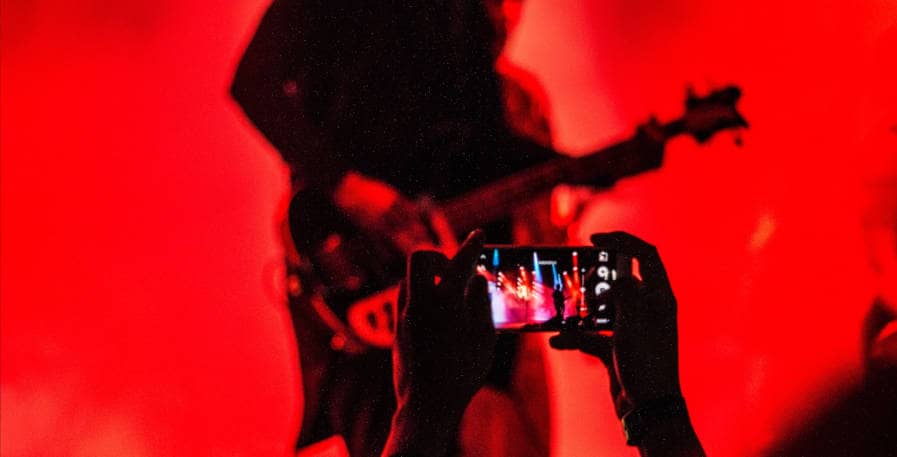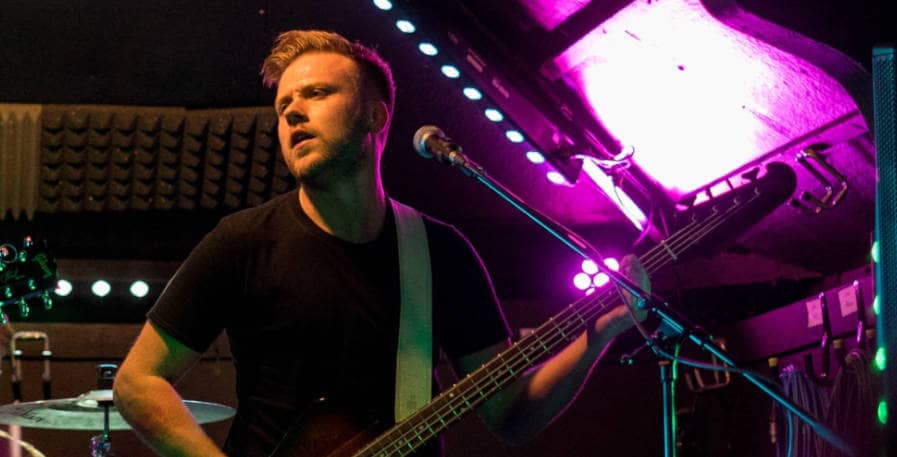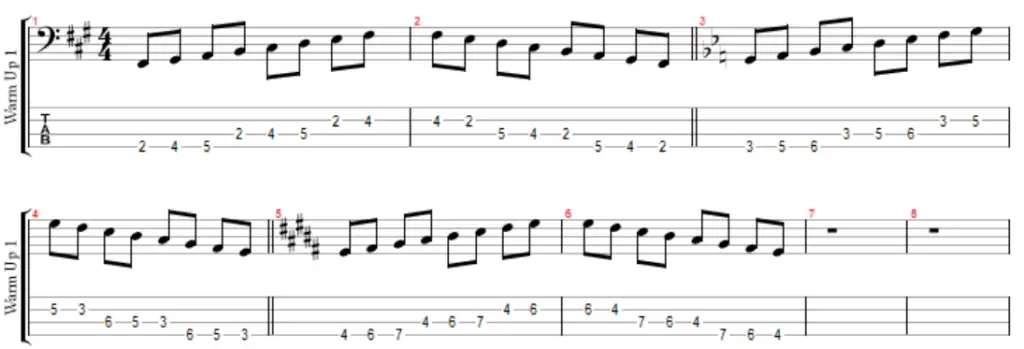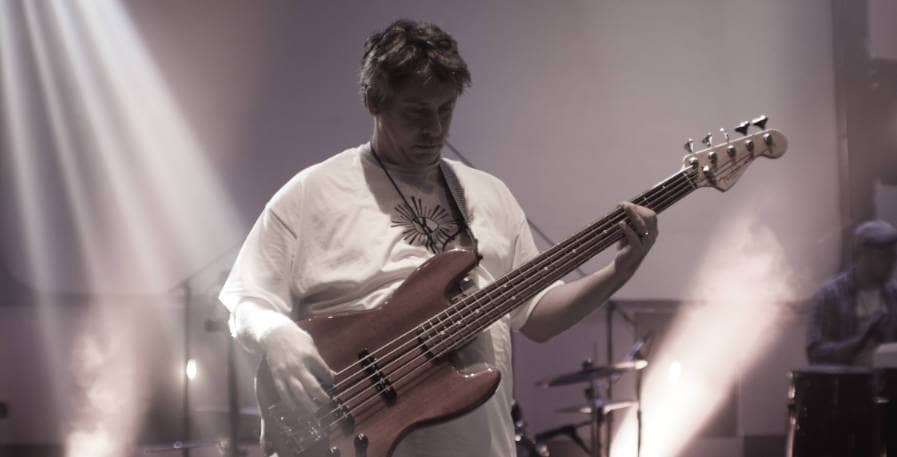Playing live bass is vastly different from playing at home or in a rehearsing space.
During a live show, you have to think about how you move, and how you interact with both your band and the audience. You also need to listen to a mix of your band that you are not used to.
Then there are all the elements of playing bass live outside of the performance. In fact, what you do before and after a show, can oftentimes be more important than what you do during it.
This can be a lot to take in. Therefore, I decided to share some tips for playing bass live from my 16 years of experience.
A lot of these tips come from mistakes that I made when I just started out playing live. Thus, I hope that you make good use of them so that you won`t have to learn them the hard way as I did.
1. Move
You probably saw this tip coming a mile away. However, bass players are notorious for standing still, and the importance of moving during a show can not be understated.
How much you should move depends on what style of music you are playing.
While a jazz bassist might not move as much as a metal bassist, neither should stall still. For more laid-back genres where one might be tempted to stand still, there are countless ways you can move around. Here are just some of them:
- Rock back and forth
- Nod your head to the rhythm
- Walk around the stage
- Go and stand with the other members of your band
- Stamp your foot to the rhythm
- Walk up to the audience
- Go play by the drum set
While most of these points might seem like small things, they all beat standing still by a mile.
Not all songs call for you to go crazy on stage. However, every song on earth calls for you to not look like you are practicing on your own. Just by moving at all and showing that you are invested in the performance, you make a massive difference in how engaged people will be in your show.
2. Listen to the other instruments
The bass is often called the glue that ties the other instruments together. Thus, you want to always be aware of the parts that you are trying to glue.
It can be hard at first, as your band will sound different than you are used to in your rehearsal space.
This can lead to the mistake of just trying to nail your part instead of listening. However, it`s an essential part of playing bass live to be able to pick out and play with your band members despite this. This is because the band will sound significantly tighter and well-connected overall when you are actively adapting to what the other members are doing.
While everyone is important, it is crucial that you listen to the drums in particular. This is less of an issue at smaller venues and when you are standing right next to the drums. However, if it ever becomes a problem, it needs to be fixed quickly.
If you cannot hear the drummer or another member sufficiently well, the mix in the stage monitors needs to be adjusted.

3. Use the stage monitors
What you hear on stage during your show will sound different from what the audience hears. This is in large part due to stage monitors. These monitors give you a unique mix of the band, with the intention of making it easier for you to hear all the instruments.
This is a helpful tool, and as a bass player, it can make or break how well you are able to lock in with the other members of the band.
Ideally, it will be set up so that you can hear all other instruments clearly. In practice, this will often not be the case. You can however signal to the person controlling the sound to change the mix on the monitor during the show. This person will generally be standing behind a mixing desk in the audience.
Thus, if you struggle to hear certain instruments, it`s best to ask the mix in the monitor to be adjusted. You can do this with the help of hand signals, such as pointing to yourself and then upwards to have your own volume raised.
Alternatively, if you have a microphone you can ask between songs, or have your singer do it for you.
4. Accept Stage Fright
Stage fright is common among musicians. I still get it every single time before I play a live show. Yet, when I go on stage and start playing, that fear has to be pushed aside in order for me to make it the best show that I possibly can.
This would not be possible unless I focused on letting loose and giving a good performance. This does not mean that the stage fright is gone, but more so that I tell it “I don`t have time for you right now”.
“I learned that courage was not the absence of fear, but the triumph over it. The brave man is not he who does not feel afraid, but he who conquers that fear.”
Nelson Mandela
I have also found that it helps to just focus on having fun and enjoying the opportunity to play live.
Chances are that you are really passionate about music if you have gone through the effort of learning to play bass and finding a band. Thus, don`t let anything stop you from enjoying one of the best things about being a bass player.
5. Check your sound before you start playing
In general, you should have time for a proper sound check.
You will however not have that opportunity at every gig, especially when you are just starting out. This holds especially true at events with a lot of bands that play short sets in rapid succession.
While you sometimes have to make do without a sound check, you should still check your tone and volume. The bass player that just played before you might have tried to sound like Lemmy. Unless you play in a Motörhead cover band, the EQ on the bass amp will not suit your tone at all in this case.
Thus, be aware of what bass tone you should have, play a couple of notes, and do some basic EQing on the amp before you start playing. It`s not going to be perfect, but you should never go in blind without having checked your tone.

6. Warm Up
Playing bass with cold hands can completely ruin a live performance. Your fingers will also feel stiff and less fluid when playing without warming up, even when you don`t feel cold.
Thus, it is a best practice to warm up before every live show you ever play.
If you have a warm-up routine that works for you, I recommend sticking to it. For those of you who don`t usually warm up, here are some basic exercises you can use to warm up before playing bass live:



For these, and any other exercise, it is best to start slow and speed up gradually. What bass exercises you do is not detrimental, what is important is that you warm up at least a little bit before playing live.
7. Don`t let your hands get cold again
This one might sound obvious, but it`s a mistake I`ve made more times than I`d like to admit.
I find that warming up for about 10-15 minutes is generally enough. Also, try to time the warm-up as close as possible to when you are about to go on stage.
After doing the bulk of my warmup, I usually also continue to play easy licks on the bass until the moment before I go on stage. This is the best way of ensuring that my hands don`t cool down again, without tiring them out before the show.
8. Make a good impression
If you make a bad impression, you will not get invited back to play at the venue.
This has little to do with the quality of your performance. However, it has everything to do with how easy you are to work with, and whether you are polite and well-behaved.
I`ve seen some musicians show up with the biggest ego in the world and think they are above other people. Do not do that, and if you see your bandmates behaving poorly make sure to pull them back down to earth.
Making a bad impression will only result in you losing out on the chance to play at the venue again. This also leads to a bad reputation, as people at the venue are generally involved in the local music scene. Thus, their view of you as a person will have an impact on how your band is perceived as a whole.

9. Stay hydrated
Don`t neglect the importance of drinking enough water prior to and during your live show.
Some gigs will have warm lights. They will make the show look better, but they can also be incredibly hot and thirst-inducing. Since you followed the other tips in this article, you will also get sweaty from moving around, which will lead to further exhaustion.
Thus, not staying sufficiently hydrated can lead to you feeling exhausted and lethargic, especially during a longer show.
10. Engage the audience
While it`s common for the singer to do the bulk of the audience interaction, it doesn`t mean you shouldn`t do some too.
As with moving, any interaction is significantly better than none. Here are some ways you can make engage the audience, even though you are playing the bass:
- Make eye contact. This works best when it`s brief, and by giving a confident and acknowledging look. It also works best when done sparingly, and a couple of times at most with each person.
- Sing with them. If the audience sings to you, sing back to them. This will make the performance significantly more engaging for them. Stay away from the mic if you`re not taking on an active vocal role in your band. Also, be careful with this one, as singing and playing bass can throw off your timing if you are not used to it.
- Acknowledge engaged audience members. Is someone singing along to every song? Did someone start a circle pit, or is headbanging as intensely as you`ve ever seen? If you ever see an audience member being invested like this in your performance, acknowledging them will make their day. A head nod, a thumbs up, or a smile goes a long way.
- Clap along. If your song calls for clapping and you are not busy playing a bassline, go ahead and clap. When doing so, it`s helpful to look at the audience, as it gives acknowledgment to those who are clapping with you. It also makes it more likely for people to feel more engaged and start clapping along with you.
11. Tune
A bass guitar can often stay in tune for long periods of time. This holds especially true if you have used the same set of strings for a while.
However, changes in temperature and humidity will make your bass more prone to getting detuned. Bringing your bass to a new venue will thus often lead to these types of changes. As a result, your bass will detune quicker when you bring it to a venue than when you keep it in a rehearsal space or in your room.
Therefore, always tune your bass before you play a live show.
12. Bring an extra set of strings
You never know when a bass string is going to break.
Luckily, I`ve never broken a string during a live show, but I know plenty of people who have. If you are not properly prepared in the case of a string breaking, it can be disastrous for the performance.
Therefore, always bring an extra set of strings with you. Unopened bass strings don`t have an expiry date, and it doesn`t take long to fasten and tune a single string.
You can also solve this issue by having an extra bass ready at the venue. If you can`t bring one, it`s a best practice to ask bassists in other bands that are playing if you can borrow theirs in the case of an emergency.
13. Talk to people
When I first started out, I used to dislike networking. I also didn`t think it was that important, and that the music would speak for itself.
With time though, I`ve come to understand that talking to people at the concert is incredibly important. I`ve also come to appreciate it as a fulfilling experience, rather than a chore.
First of all, people will be much more invested in a gig if they have any connection to the band. You might have noticed this yourself if you have seen a friend or acquaintance perform. You are invested in the person, and therefore in the performance as well.
Second, talking to people will lead to opportunities and relationships. It will lead to the person being invested in your band and mentioning your name in conversation which leads to more exposure.
Most importantly, it lets you become part of a community. This makes you someone to root for, rather than just someone who plays music they may or may not like.
And here`s the best part: You can just be yourself.
You don`t have to bring a sales pitch or advertise your band. You are at a concert venue, chances are good that bringing up your band will come up naturally in conversation. Even in the rare case that it doesn`t happen, they will still see you on stage and feel that they have a connection to you.
Thus, talking to people makes a major difference in the productivity of a live show and how the concert-goers perceive your band. It also doesn`t have to feel like a task, but rather a fun experience where you connect with people with similar interests.

